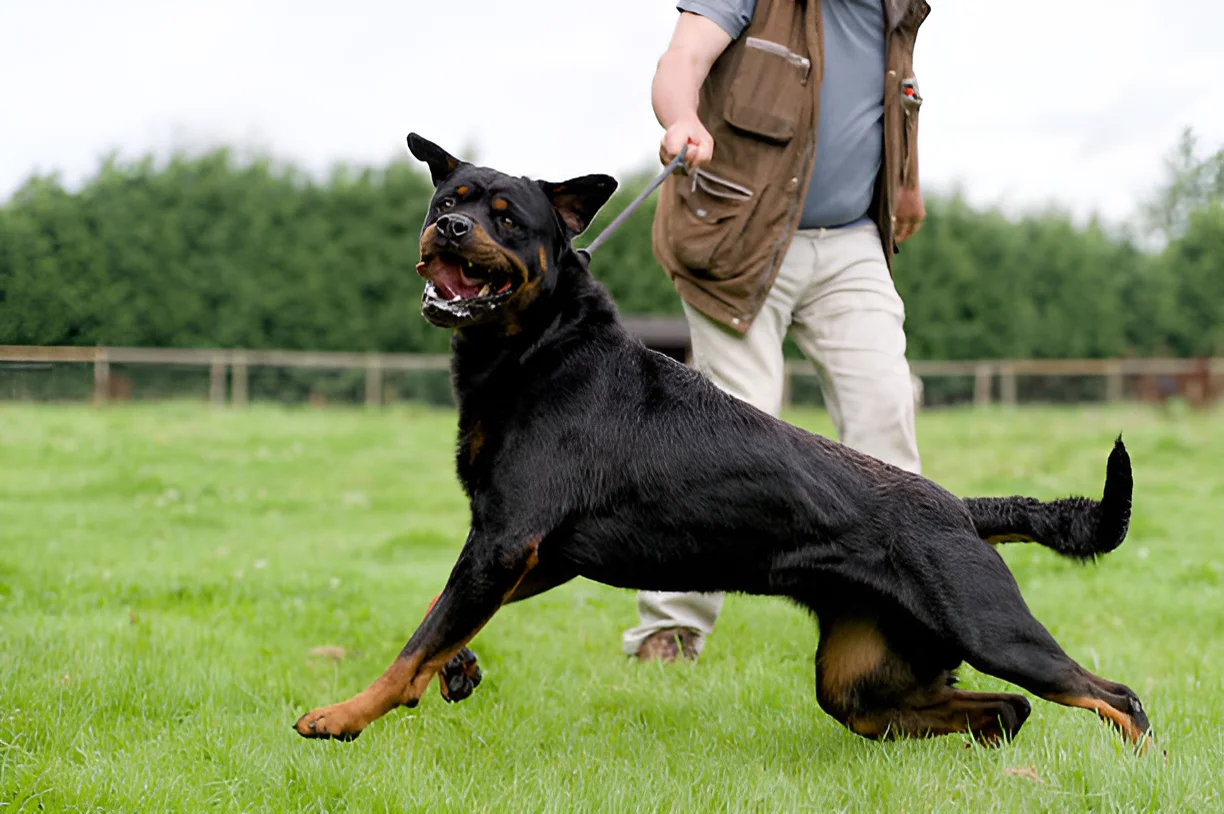Yes, Rottweilers are commonly used as guard dogs due to their strength, loyalty, and protective instincts. Understanding their history, temperament, and training needs can help you appreciate why they are such effective guardians.
Rottweilers have long been recognized for their guarding abilities. Their imposing presence, combined with their intelligence and loyalty, makes them excellent protectors of homes and properties. This comprehensive guide will explore the reasons why Rottweilers are used as guard dogs, their history, temperament, training requirements, and how to ensure they are well-suited for this role. Whether you’re considering a Rottweiler for protection or simply curious about the breed, this article will provide valuable insights and practical advice.
The History of Rottweilers as Guard Dogs
Rottweilers have a rich history that dates back to the Roman Empire. They were originally used as herding dogs, driving cattle to market and guarding the livestock from predators and thieves. Their role as protectors continued through the centuries, and they became known as “Rottweiler Metzgerhund” or “Rottweil butchers’ dogs” in Germany, where they guarded butcher shops and transported meat.
Key Historical Roles:
- Herding and Guarding Livestock: Rottweilers were essential in protecting livestock from predators and thieves.
- Guarding Property: Their guarding instincts made them ideal for protecting homes and businesses.
- Military and Police Work: Rottweilers have been used in military and police roles due to their strength, intelligence, and trainability.
Temperament and Characteristics
Rottweilers possess several traits that make them well-suited for guarding duties. Understanding these characteristics can help you appreciate their effectiveness as guard dogs.
Loyalty and Protective Instincts:
- Loyal Companions: Rottweilers are known for their loyalty to their families. They form strong bonds and are protective of their loved ones.
- Natural Guardians: Their protective instincts are deeply ingrained, making them vigilant and alert to potential threats.
Strength and Physical Presence:
- Imposing Size: Rottweilers are large, muscular dogs that can weigh between 80 to 135 pounds. Their size alone can be a deterrent to intruders.
- Strong Bite Force: With a bite force of around 328 PSI, Rottweilers have one of the strongest bites among dog breeds.
Intelligence and Trainability:
- Quick Learners: Rottweilers are intelligent and quick to learn commands. This makes them highly trainable for various tasks, including guarding.
- Obedience: They respond well to consistent training and positive reinforcement.
Training Rottweilers as Guard Dogs
Proper training is essential to ensure that a Rottweiler can effectively and safely perform guarding duties. Here are some key aspects of training a Rottweiler as a guard dog:
Early Socialization:
- Exposure to Different Environments: Introduce your Rottweiler to various environments, people, and other animals from a young age. This helps them become well-adjusted and reduces the risk of fear-based aggression.
- Positive Experiences: Ensure that socialization experiences are positive and rewarding to build confidence and trust.
Basic Obedience Training:
- Commands: Teach basic commands such as “sit,” “stay,” “come,” and “leave it”. These commands are essential for managing your dog’s behavior.
- Consistency: Use consistent commands and positive reinforcement techniques to encourage good behavior.
Guarding-Specific Training:
- Alert Barking: Train your Rottweiler to bark on command and to stop barking when instructed. This helps them alert you to potential threats without becoming a nuisance.
- Controlled Aggression: Teach your Rottweiler to differentiate between real threats and non-threatening situations. Controlled aggression ensures they respond appropriately to different scenarios.
- Boundary Training: Establish clear boundaries for your Rottweiler to patrol and protect. This helps them understand their role and responsibilities.
Professional Training:
- Seek Expert Help: Consider working with a professional dog trainer who specializes in guard dog training. They can provide advanced training techniques and ensure your Rottweiler is well-prepared for guarding duties.
Ensuring a Balanced Temperament
While Rottweilers are naturally protective, it’s important to ensure they have a balanced temperament. This involves providing proper care, training, and socialization.
Regular Exercise:
- Physical Activity: Provide regular exercise to keep your Rottweiler physically fit and mentally stimulated. Activities such as walks, runs, and playtime are essential.
- Mental Stimulation: Engage your Rottweiler in mentally stimulating activities such as puzzle toys, training sessions, and interactive games.
Health Care:
- Veterinary Check-Ups: Schedule regular veterinary check-ups to monitor your Rottweiler’s health and address any issues promptly.
- Nutrition: Feed your Rottweiler a balanced diet that meets their nutritional needs.
Social Interaction:
- Family Time: Spend quality time with your Rottweiler to strengthen your bond and provide emotional support.
- Positive Reinforcement: Use positive reinforcement techniques to encourage good behavior and build trust.
Conclusion
Yes, Rottweilers are commonly used as guard dogs due to their strength, loyalty, and protective instincts. Understanding their history, temperament, and training needs can help you appreciate why they are such effective guardians. By providing proper training, care, and socialization, you can ensure your Rottweiler is well-suited for guarding duties and remains a loving and loyal companion.
The photo featured below the post headline is Credit: dageldog/istockphoto
I hope you find this post helpful and informative. If Yes’ feel free to share it with your friends!
Frequently Asked Questions
Are Rottweilers used as guard dogs?
Yes, Rottweilers are commonly used as guard dogs due to their strength, loyalty, and protective instincts.
What makes Rottweilers good guard dogs?
Their loyalty, protective instincts, strength, intelligence, and trainability make them excellent guard dogs.
How do I train my Rottweiler to be a guard dog?
Provide early socialization, basic obedience training, guarding-specific training, and consider working with a professional dog trainer.
What are the common health issues in Rottweilers?
Common health issues include hip dysplasia, elbow dysplasia, and heart conditions. Regular veterinary check-ups are essential.
How can I ensure my Rottweiler has a balanced temperament?
Provide regular exercise, mental stimulation, proper nutrition, and positive social interaction.

